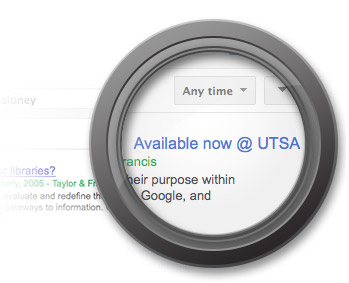- Find Information
- Research Guides
- PSY 5113: Professional Ethics and Standards (Lopez)
PSY 5113: Professional Ethics and Standards (Lopez)
Searching Efficiently
AND: Use this between different concepts.
Example of using AND: teens AND anxiety
How it affects your search: This will find all items in with BOTH of these search terms. Using AND between search terms that represent different concepts decreases the number of results.
OR: Use this between similar concepts.
Example of using OR: (teens OR adolescents) AND therapy
How it affects your search: This finds all items with either the term teens or the term adolescents and the term therapy. Using OR between related terms increases the number of results.
NOT OR AND NOT: Use in front of terms you want to exclude from your search.
Example of using NOT:
(teens OR adolescents) AND NOT children
How it affects your search: This finds all items with the term teens and the term adolescents but excludes any items with the term children. Though NOT is not used as frequently as other connectors, It is helpful if you are getting a lot of results on a population or covering a concept that is not related to your personal topic.
(): use this combined with OR to group similar terms together. This is called “nesting” and works like the order of operations in math.
Example of nesting: (teens OR adolescents OR teenagers) AND (anxiety OR social phobia) AND therapy
How it affects your search: This finds all items with the term teens or the term adolescents or the term teenagers and all items with either anxiety or social phobia and the term therapy.
“ “: use this to find exact phrases.
Example of using quotes: “random assignment”
How it affects your search: This finds all items with the exact phrase “random assignment” and will exclude any items that do not have random and assignment together and in this exact order. Use for phrases only. You do not need to use quotes around single terms.
*: use this with a common root word to find variant endings. This is called truncation.
Example of using *: teen*
How it affects your search: This finds all items that start with the word teen but that have different endings. It will find all items with any of these: teen, teens, teenager, or teenagers. As you can see, truncation will increase your results.
Searching: Sample Searches for Journal Articles



Using Google Scholar off campus?
If you plan to use Google Scholar off campus and want to access full-text articles, you'll need to link UTSA Libraries to your Google Scholar. This can be done by following the directions below
- From scholar.google.com, sign in to your Google account, or use your abc123@my.utsa.edu and passphrase
- Click at the top left corner
- Click
- Click Library Links
- Search for UTSA
- Select UTSA Libraries – Available Now @ UTSA
- Be sure the box next to UTSA Libraries – Available Now @ UTSA is checked
- Click Save
Click the Available Now @ UTSA link for full-text access to an article. If you don't see the link, submit a Get It For Me request, and we’ll get the material from another library for you.
